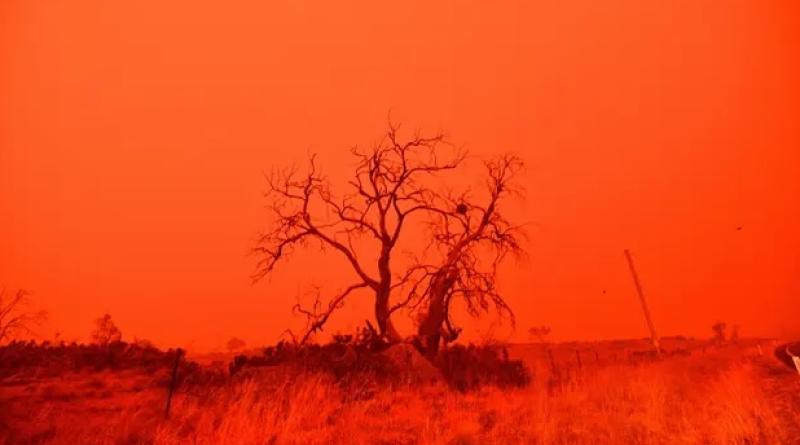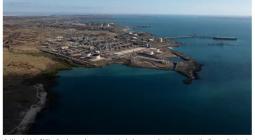In Australia’s climate wars, delay and deception are the new denial

For climate change in Australia, 2021 was the year of the bullshit absolution narrative. The wide grin of a promise of good, with a bag of sinister held behind the back. This was 2021’s grubby climate through-line.
The first tactic deployed to protect the fossil fuel industry, organised denial of the science proving the link between greenhouse gas emissions and global heating, was terribly impactful. Though we’ve stamped that out, the space has been filled by a more effective and insidious problem: climate delay. This refers to a suite of spurious arguments used to justify not reducing emissions at all, or reducing them at as slow a rate as possible. You’ve heard these before – they include pleas to wait for better technology, redirecting responsibility to others or emphasising the downsides of action.
In Australia, in 2021, governments, corporations, lobbyists, media companies and marketing firms engaged in a weird kind of convergent rhyme. They each realised that a deeply concerned citizenry must be distracted, and the people power that emerged in the 2019 climate marches defused. So, they poured their efforts into figuring out how to best lie about acting on climate (instead of the easier and cheaper option of actually acting on climate).
The most obvious example is the conservative Coalition government in Australia. They’ve used the old approach of hollow techno-optimism to mask the total absence of real-world emissions reductions, repackaged this year within the loophole-ridden “net zero” marketing framework. The target of a 26% reduction by 2030 is an international embarrassment. Official government projections show that without any effort at all, emissions will fall by around 30%, due mostly to the growth of renewables (in a grim moment, this was rebranded as an escalation in ambition, and tricks were used to tweak the figure to 35%).
The federal government has explicitly incentivised new fossil fuel projects – funding gas power plants, and helping coal and gas mines get off the ground. But in parallel, Australia’s diplomatic forces overseas ran an organised campaign of greenwashing, twisting emissions data to falsely present the country’s past performance and future targets as ambitious, culminating in the Cop26 conference in Glasgow.
The government’s insincerity isn’t well obscured. Scott Morrison danced with literal joy when a gas field with unlocked emissions equivalent to 15 coal plants cleared a major hurdle. Less obvious and far less acknowledged is how pervasive the tactics of climate delay have sunk within other players in Australia’s climate debate.
The Labor party announced that they were revising down their previous 2030 target of 45% (which they took to the 2019 election) to 43%. That prior target was itself sourced from a report published in 2015, which recommended between 40% and 60%.
While the renewable energy parts of Labor’s plan are respectable, the industry sector elements leave a wide range of questions open enough for high emitters to exploit to their advantage. Their trajectory to 2030 relies just as heavily as the Coalition’s 2050 net zero plan on the purchase of offsets instead of emissions reductions. Both major parties fail to include any controls to ensure that companies aren’t just buying up cheap, dodgy offsets instead of reducing their greenhouse gas emissions. Labor also plans to adopt and reform the Coalition’s loophole-ridden “safeguard mechanism” policy, with little clarity on exactly how that reform will take place. Major emitters and fossil lobby groups cautiously welcomed Labor’s plan while laying down the language to frame any real emissions reductions as dangerous or destructive.
Labor’s policy was sold as a bottom-up, realist approach. In reality, it leaned heavily on the Business Council of Australia’s policy suggestions, leaving gaps and loopholes that could easily be widened into major climate failure by motivated high-emitters.
Running defence for the political delayers and Australia’s worst corporate emitters was News Corp, who wrapped their verifiably awful record on climate in a veil of revisionist greenwashing. Mirroring both major parties, articles like “What polluters are doing to help” serve as the public relations engine of this wider narrative of fabricated action. Rarely acknowledged is the group of marketing and public relations firms getting paid eye-watering sums to churn out climate delay, exposed jointly by CommsDeclare and Clean Creatives.
I know we were broken down by an exhausting decade of climate denial. But that exhaustion has created a hopeful credulity. A vulnerability to under-interrogating these glossy stories of reformation.
Stop fighting, we asked. Please, end the “climate wars”. Well, they did. Both major parties and industry are in peaceful agreement to fail badly on domestic emissions while extracting planet-wrecking quantities of carbon so it can be burned overseas.
The future can only lie in kicking big, destructive holes in the wall of false reassurances and disinformation used to delay climate action. It was easy to spot wide-eyed climate deniers. Can you spot a net zero target packed with backloading and offsets? You need to.
I know that Australia’s politicians and fossil fuel executives watched the gut-wrenching black summer bushfire crisis, the same as I and much of the world did. They watched the deep-red skies in the shaky smartphone footage, and the exhausted firefighters collapsing on the streets. Maybe their hearts dropped in their chests when they briefly came face to face with the consequences of unbridled emissions and a heating planet.
Two years on, we know for sure that their only real, lingering response was to scramble to figure out new ways to lie about the damage they’re doing. In 2022, we need to reignite the climate wars and fight back against the deadly cult of delay.
cover photo: ‘I know that Australia’s politicians and fossil fuel executives watched the bushfire crisis … Maybe their hearts dropped when they briefly came face to face with the consequences of unbridled emissions and a heating planet.’ Photograph: Saeed Khan/AFP/Getty Images






